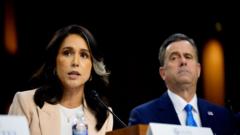The recent disclosure of a compromised group chat involving President Trump's national security team has raised serious concerns in Washington. Journalists revealed that during an incident involving the encrypted messaging app Signal, he inadvertently joined a chat where discussions about military airstrikes in Yemen were occurring. The chat included high-ranking officials such as U.S. Director of National Intelligence Tulsi Gabbard and CIA Director John Ratcliffe, both of whom denied in a Senate hearing that classified information had been exchanged.
The incident, termed as "Signalgate" by some, has drawn severe criticism and accusations of incompetence from Democratic senators, particularly toward Defense Secretary Pete Hegseth, who did not testify at the hearing. Hegseth has been pointed to as the authority on what constituted classified information in the abrupt exchange of messages.
The topic overshadowed a Senate Intelligence Committee hearing which was originally scheduled to address issues related to drug cartels. During the exhaustive questioning, Ratcliffe maintained that operational details regarding the airstrikes were not explicitly discussed, stating, "I was not aware of any specific operational information." Gabbard echoed the sentiment, stating that what occurred was an inadvertent release, not a malicious leak.
Following the airstrikes, which resulted in the deaths of 53 individuals, pressure has mounted on Trump’s administration to clarify the protocols surrounding sensitive discussions. Analysts have noted that such vulnerabilities, especially in terms of communication security, pose serious risks to national safety.
As the uproar continues, both Trump and his team have downplayed the event, with the President labeling the invitation of the journalist as a simple "glitch." Trump has expressed support for his National Security Advisor Mike Waltz while stating that the incident should not distract from the administration’s achievements.
Despite these assertions, experts have pointed out the dangerous precedent set by discussing sensitive information on civilian apps. A non-partisan watchdog group has initiated legal action against the officials involved, highlighting potential violations of the Federal Records Act due to the app's automatic message deletion feature.
In the aftermath, Signal has defended its technology against allegations of vulnerabilities, labeling it as "the gold standard for private, secure communications," amidst ongoing scrutiny surrounding this significant security lapse. The ramifications of such discussions happening on a consumer-grade platform underscore the critical need for strict compliance and oversight in securing national security information.
The incident, termed as "Signalgate" by some, has drawn severe criticism and accusations of incompetence from Democratic senators, particularly toward Defense Secretary Pete Hegseth, who did not testify at the hearing. Hegseth has been pointed to as the authority on what constituted classified information in the abrupt exchange of messages.
The topic overshadowed a Senate Intelligence Committee hearing which was originally scheduled to address issues related to drug cartels. During the exhaustive questioning, Ratcliffe maintained that operational details regarding the airstrikes were not explicitly discussed, stating, "I was not aware of any specific operational information." Gabbard echoed the sentiment, stating that what occurred was an inadvertent release, not a malicious leak.
Following the airstrikes, which resulted in the deaths of 53 individuals, pressure has mounted on Trump’s administration to clarify the protocols surrounding sensitive discussions. Analysts have noted that such vulnerabilities, especially in terms of communication security, pose serious risks to national safety.
As the uproar continues, both Trump and his team have downplayed the event, with the President labeling the invitation of the journalist as a simple "glitch." Trump has expressed support for his National Security Advisor Mike Waltz while stating that the incident should not distract from the administration’s achievements.
Despite these assertions, experts have pointed out the dangerous precedent set by discussing sensitive information on civilian apps. A non-partisan watchdog group has initiated legal action against the officials involved, highlighting potential violations of the Federal Records Act due to the app's automatic message deletion feature.
In the aftermath, Signal has defended its technology against allegations of vulnerabilities, labeling it as "the gold standard for private, secure communications," amidst ongoing scrutiny surrounding this significant security lapse. The ramifications of such discussions happening on a consumer-grade platform underscore the critical need for strict compliance and oversight in securing national security information.




















